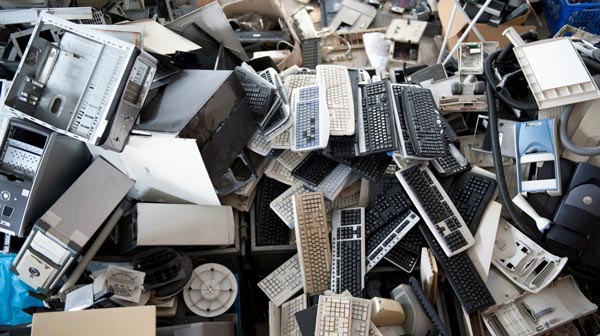R2 Certification Electronics Recycling: Your Assurance for Accountable Disposal
R2 Certification Electronics Recycling: Your Assurance for Accountable Disposal
Blog Article
Elevate Your E-Waste Management With R2 Qualification: a Thorough Introduction
One key method to raise e-waste monitoring practices is by obtaining R2 qualification. By discovering the procedures and benefits connected with R2 certification, a deeper understanding of just how it can reinvent e-waste management approaches emerges, losing light on a course in the direction of sustainability and ethical disposal techniques.
Value of E-Waste Monitoring

When e-waste is not managed properly, these toxic compounds can permeate into the ecological community, causing injury to wildlife and potentially getting in the food chain, presenting threats to human health and wellness. The inappropriate disposal of e-waste adds to air pollution and greenhouse gas emissions, worsening environment change and environmental deterioration.

Benefits of R2 Qualification

Firstly, R2 accreditation enhances integrity by showcasing an organization's commitment to lasting practices. It ensures customers, partners, and stakeholders that the firm abides by strict criteria for e-waste management - r2 certification. This integrity can lead to boosted trust fund and enhanced partnerships with customers who prioritize ecological responsibility
Secondly, R2 accreditation aids mitigate dangers related to improper e-waste disposal. By adhering to the strict guidelines stated by the accreditation, companies can lessen the likelihood of information breaches, ecological contamination, and lawful consequences. This aggressive method safeguards the firm's reputation and decreases possible liabilities.
Last but not least, R2 accreditation demonstrates a dedication to ecological stewardship - r2 certification. By sensibly managing digital waste via licensed procedures, companies add to the preservation of sources, decrease of contamination, and promo of a circular economic climate. This dedication not only benefits the environment but also aligns with evolving customer assumptions for lasting service methods
R2 Accreditation Process Overview
Having established the advantages of R2 qualification in promoting reputation, threat reduction, and environmental stewardship, it is important to now outline the thorough procedure associated with obtaining this qualification. The R2 certification process starts with a complete evaluation of the organization's functional policies and procedures to make certain compliance with the R2 standard. This first evaluation is essential in recognizing any type of gaps that require to be attended to before continuing even more.
As soon as the organization's practices straighten with the R2 conventional needs, an independent third-party auditor carries out an on-site audit to evaluate the execution and efficiency of these techniques. This audit includes a comprehensive evaluation of documentation, meetings with staff, and physical assessments of facilities to confirm compliance.
Complying with a successful audit, the company receives an accreditation choice based on the auditor's searchings for. If approved, the organization is provided R2 accreditation, showing its commitment to accountable e-waste monitoring. It is essential to keep in mind that maintaining R2 accreditation calls for ongoing compliance with the criterion's requirements and regular view it audits to make certain continued adherence to finest methods in e-waste recycling and disposal.
Trick Criteria for R2 Compliance
An essential aspect of accomplishing R2 conformity is ensuring that all electronic waste (e-waste) handling centers satisfy rigorous ecological and safety requirements. To follow R2 requirements, organizations need to abide by vital criteria that concentrate on accountable e-waste administration practices. These criteria consist of implementing a documented environmental, health, and safety and security administration system, making certain the secure handling of data-containing tools, and carrying out comprehensive downstream due diligence to track the last read the article destination of e-waste products.
In addition, R2 compliance demands the proper screening, refurbishment, and recycling of digital equipment to expand its useful life and minimize environmental impact. Facilities seeking R2 accreditation should additionally prioritize employee wellness and safety and security by giving essential training, individual protective equipment, and a safe workplace. Furthermore, preserving comprehensive records of e-waste handling activities and on a regular basis going through audits by certified certifying bodies are vital parts of demonstrating ongoing conformity with R2 requirements.
Impacts of Lasting E-Waste Practices
The execution of sustainable e-waste practices in conformity with R2 compliance not just makes sure ecological and safety and security requirements are met yet likewise considerably influences the general lifecycle of electronic items. By adhering to R2 criteria, electronic waste monitoring processes come to be a lot more efficient, minimizing the environmental impact of electronic items. Sustainable e-waste techniques help with the correct disposal of electronic parts, guaranteeing that hazardous materials are taken care of properly and do not wind up polluting the setting.
Furthermore, welcoming sustainable e-waste methods advertises the circular economic situation by helping with the healing and reuse discover here of valuable materials from digital items. This not only saves priceless resources however additionally decreases the requirement for basic material extraction, lessening the ecological impact of electronic manufacturing. Additionally, sustainable e-waste methods can add to job creation in the recycling and refurbishment fields, fostering economic growth while advertising ecological duty. In general, the adoption of lasting e-waste techniques under R2 certification works as an essential step in the direction of attaining a more environmentally sustainable electronic devices sector.
Conclusion
In conclusion, applying proper e-waste monitoring methods is critical for ecological sustainability and source preservation. R2 accreditation plays a crucial function in guaranteeing responsible handling and disposal of electronic waste. By sticking to the rigid requirements stated by R2 standards, companies can not just reduce their environmental influence yet additionally contribute to a more lasting future for generations to find.
One secret method to boost e-waste administration methods is by attaining R2 qualification. By checking out the benefits and procedures linked with R2 accreditation, a much deeper understanding of exactly how it can revolutionize e-waste monitoring techniques emerges, losing light on a path in the direction of sustainability and honest disposal practices.
The R2 accreditation procedure begins with a thorough evaluation of the organization's functional policies and treatments to ensure conformity with the R2 standard. If authorized, the organization is approved R2 certification, showing its commitment to accountable e-waste management. Generally, the fostering of sustainable e-waste techniques under R2 certification offers as an essential action towards accomplishing an extra ecologically lasting electronics market.
Report this page